By Avigayil Kadesh
Once upon a time, Dizengoff Street in Tel Aviv was like the Fifth Avenue or the Champs Elysees of Israel. Built in the 1930s and named after Tel Aviv’s first mayor, Meir Dizengoff, the boulevard was lined with fancy shops and cafés and many of the Bauhaus International-style buildings that gave Tel Aviv its nickname of “White City.”
So central was this stretch of road to the culture of the new city of Tel Aviv that a new Hebrew verb, “l'hizdangef” (“to Dizengoff”) was coined to express the action of strolling down its two-mile span, which runs north nearly from the Tel Aviv Port down just past the
Mann Auditorium concert hall in the south.

Dizengoff Street in the 1930s
Photo courtesy of Wikimedia CommonsNow, following a gradual decline that took the luster off the street beginning in the 1970s, Dizengoff has once again become a place to see and be seen.
This is not where you’d go to shop at branches of upscale stores like Gucci or Louis Vuitton – go east to Hamedina Square for that – but you will find outlets for made-in-Israel fashion and food, nightlife and culture, and also architecture, as the old white buildings are restored and shown to visitors by guides from the
Bauhaus Center at No. 99 Dizengoff.
Next time you’re “Dizengoffing,” you might even catch a glimpse of Madonna if she’s in Israel, because the Kabbalah Center that she frequents on her visits is located on -- you guessed it -- Dizengoff Street.
Probably the most distinguishing characteristic of the street is its proliferation of bridal salons. Particularly along the blocks north of Arlozorov Street, you can’t go more than a few paces on Dizengoff without passing a display window full of fancy white gowns. Often you will see brides-to-be, along with their mothers or sisters, getting fitted inside.
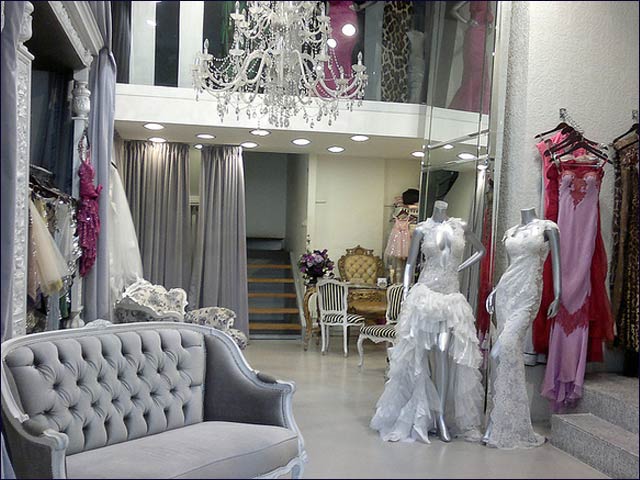 Inside a Dizengoff bridal salon
Inside a Dizengoff bridal salon
On a recent walk down Dizengoff Street, we ask one bridal shop owner why this is so, and she shrugs. “It’s been like that for many years,” she says. “As soon as one bridal store leaves, another comes in its place.”
Starting in the south
The southern end of Dizengoff Street boasts a bit of nightlife, with bars and pubs offering live entertainment on weekends.
There are also several major landmarks on this part of the boulevard.
At the southern tip of Dizengoff, after it veers to the east from its primarily north-south axis, is the Mann Auditorium, completed in 1957 as a home base for the Israeli Philharmonic Orchestra. World-famous musicians who have graced its stage include Leonard Bernstein, Izhak Perlman, Yehudi Menuhin, Daniel Barenboim, Isaac Stern and Arthur Rubinstein, along with orchestras such as the Berlin Philharmonic, the London Symphony Orchestra and the Philadelphia Philharmonic Orchestra. The 2,760-seat Auditorium frequently hosts national and international conferences as well.
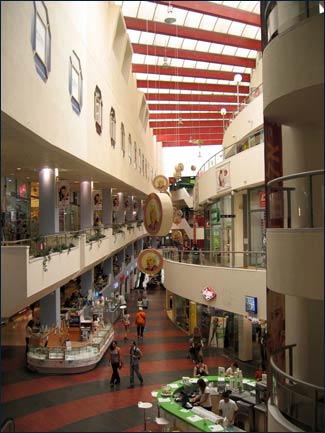
Inside Dizengoff Center, Israel’s first mallThe giant street-straddling retail hub known as Dizengoff Center, opened in 1983 as Israel's first modern shopping mall, boasts more than 400 stores (mostly branches of national chain stores such as Castro, Renuar and Fox) and a multiplex movie theater, plus restaurants, a design and exhibition center, specialty stores, and a rooftop fitness center with a swimming pool. The northern part of the mall is topped by a residential skyscraper, while an office tower sits above its southern wing.
You get from one part of the center to the other via a skywalk or underground passageways. Thursdays and Fridays, the mall’s eateries bring their best dishes to a Food Court for sampling.
Going just a bit farther north you’ll come across the 82-room
Cinema Hotel, a boutique property in a renovated Bauhaus structure that once housed the Esther Cinema, one of the first movie theaters in Tel Aviv. The Atlas Hotels chain preserved the flavor of the original building by retaining some of the original projectors and movie posters. Classic movies are screened in the hotel lobby -- with popcorn, of course.
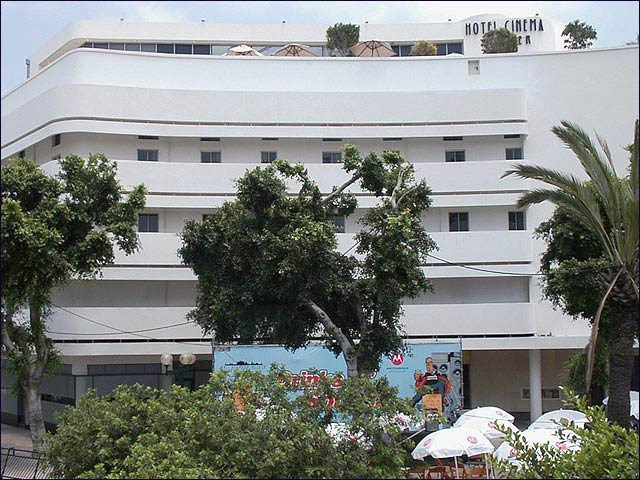
The Cinema Hotel, formerly a movie theaterThe rooftop terrace of the Cinema Hotel overlooks Dizengoff Square, a large circular plaza at the confluence of six streets, built in the 1930s in honor of the mayor’s wife, Tzina, and designed by a female architect, Genia Averbuch.
You can’t miss this square even if you’re relatively far away, because it is elevated above the street and connected to the two sides of Dizengoff with pedestrian walkways. It was lifted up as part of a reconstruction project in the 1970s, which also placed a fountain at the center of the square.
In 1986, the original fountain was replaced with one designed by renowned Israeli optical artist Yaacov Agam. Agam called his colorful kinetic sculpture the Fire & Water Fountain. It’s constructed of five large concentric rotating rings, each painted different colors. Water spurts up from the rings, and a jet of flame rises from the peak.
Agam computerized his creation to provide a music-accompanied show at the top of each hour, but the fountain isn’t always functioning properly. In 2011, in reaction to results of a public opinion poll, the municipality pledged to renovate or even move the Agam sculpture, and to bring Dizengoff Square back down to street level so that it does not obscure the view from one end of the block to the other.
Time for tea and a Story
The many new upmarket stores lining the street speak volumes about the kind of shoppers Dizengoff is attracting these days. The young, hip population of Tel Aviv gravitates here – during the day you’ll see lots of stylish mothers with baby carriages (Baby Teva -- Nature Baby-- is at No. 231), while at night the professional crowd seeks out the bars and eateries.
It’s also noteworthy that most of the store signs along Dizengoff are written in both Hebrew and English and sometimes not in Hebrew at all. Clearly an international flavor is part of the overall marketing strategy.
At No.135 Dizengoff there’s a large new store devoted to tea and tea accessories, Le Palais Des Thes. Across the street at No.132, at the corner of Gordon, is the Bara World of Medicinal Herbs.
A little farther north, on opposite corners of Ben-Gurion Street, are two well-known juice bars, Tamara (No.171) and the creatively named Shake Gurion.
Short:Story at No.173 Dizengoff is a story unto itself. It’s the latest concept store from the company 911 Fashion, founded in 2001 in order to introduce luxury fashion brands to the Israeli market. There are three Story boutiques, two in Tel Aviv (at No.246 Dizengoff and No.60 Sheinkin) and another in neighboring Givatayim.
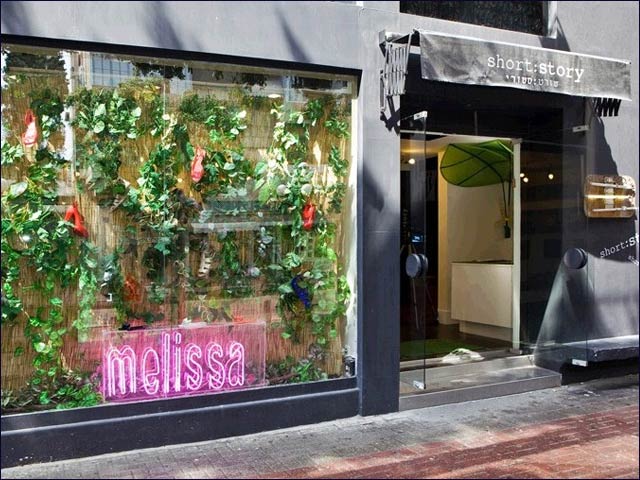
Short:Story is a trendy concept store Male and female fashionistas rave about Story for its carefully curated collection of shoes and clothing from Israeli designers and overseas brands including Melissa, Bloch, Fly London, Nudie, Fornarina, Junk Deluxe and True Religion.
Short:Story, as its clever name implies, debuts one entirely new collection every three months, after which it moves into the Story boutiques. When we visited, the amply sized shop was devoted to Switzerland-based Freitag’s pricey line of hand-sewn bags and accessories made from recycled tarpaulins, seat belts and bicycle tires. It was a coup for Story owner Ori Reiss to persuade Freitag to sell in Israel; reportedly the deal was three years in the making.
Another trendy store is Umbrella, at No.252 Dizengoff. Opened in 2011, it’s the first collective designer shop in Israel, showcasing 10 Israeli shoe, accessory, jewelry and clothing designers under a single roof: Ellen Rubin, Myka, Yolla, Nata, Meital Katz, Anna Meyer, Michal Emma, Ronica Design, Hadas Shaham and Frank Toro. Each operates a mini shop on the premises.
Homegrown and foreign design
Going north of Jabotinsky street, before Dizengoff tapers off a few blocks south of the port, you’ll pass relatively new concept shops dedicated to homegrown Israeli brands such as
shoe designer Keren Attoun, Lalo jewelry, Ori Shelly Handpicked Collections, Tal Beck Studio and Yael Orgad, among many others.Every Thursday evening from 4-11 p.m., the Tel Aviv-Jaffa municipality hosts an event called Fashionably Late -- a designers market at Dizengoff Square offering a broad selection of fashion items and accessories, presenting works by young talented designers and design school graduates from Israel. The market combines fashion design with industrial design, graphic design and plastic art.
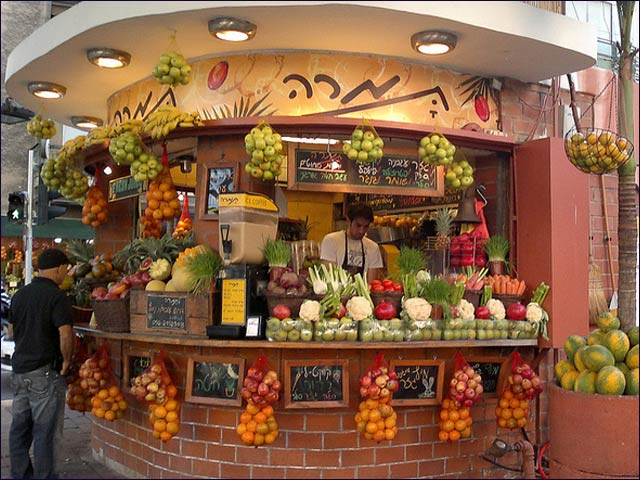
Tamara juice stand at the corner
of Dizengoff and Gordon streetsBut Dizengoff is not only about high fashion or even weddings. Things can get pretty eclectic here.
At No.255, art collector Dan Chill founded the Gallery of International Naïve Art (
GINA) in 2003. As the name implies, the works on display here are not only from Israeli artists but also from naïve-style painters from Argentina, Belgium, Bolivia, Brazil, Canada, Costa Rica, Croatia, Cuba, Denmark, Ecuador, El Salvador, Finland, France, Greece, Guatemala, Honduras, Hungary, Italy, Mexico, Nicaragua, Panama, Peru, Portugal, Romania, Russia, Serbia, Spain, Sweden, The Netherlands, Turkey and the United Kingdom.
North of Yirmiyahu Street is a large collection of eateries and watering holes, such as the Rosa Parks Bar at No.265, and a pub called MASH (No.275) that is – a bit incongruously – situated directly across the street from the beautiful old Great Synagogue of North Tel Aviv.
Kelim Shloovim, at No. 229, is a unique-in-Israel gift shop representing non-profit organizations that create employment opportunities for people with emotional, physical and intellectual special needs. Behind each product for sale here “stands a person with dreams, aspirations, and the desire to integrate into the labor market,” according to the store’s website.
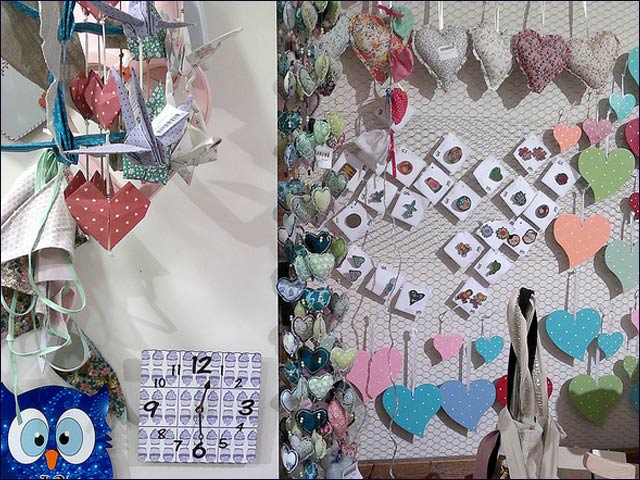
Gift items at Kelim Shloovim are made by people
with physical or mental disabilities. The renewed Dizengoff Street seems like the perfect place for those dreams to come true.